Deconstructive DEBORD "artificial terrorism." 9/11
Debord's first book, Mémoires, was bound with a sandpaper cover so that it would destroy other books placed next to it.
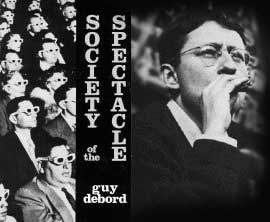
http://en.wikipedia.org/wiki/Situationist_International#Sanguinetti.27s_Report_to_save_capitalism
Sanguinetti's Report to save capitalism
By 1972, Gianfranco Sanguinetti and Guy Debord were the only two remaining members of the SI. Working with Debord, in August 1975, Sanguinetti wrote a pamphlet titled Rapporto veridico sulle ultime opportunità di salvare il capitalismo in Italia (Eng: The Real Report on the Last Chance to Save Capitalism in Italy), which (inspired by Bruno Bauer) proported to be the cynical writing of "Censor", a powerful industrialist. The pamphlet was to show how the ruling class of Italy supported the Piazza Fontana bombing and other mass slaughter, for the higher goal of defending the capitalist status quo from the communist claims. The pamphlet was mailed to 520 of Italy's most powerful individuals. It was received as genuine, and powerfully politicians, industrialists and journalist praised its content and guessed on the identity of its high profile author. After reprinting the tract into a small book, Sanguinetti revealed himself to be the true author. Scandal raised after the revelation, as it successfully exposed the truth and hypocrisy on the mass slaughters, and under pressure from Italian authorities, Sanguinetti left Italy in February 1976, and was denied entry to France
Rapporto veridico sulle ultime opportunita di salvare il capitalismo in Italia
Censor.
Published 1975 by Mursia in Milano .
Written in Italian.
Edition Notes
Includes index.
Classifications
Library of Congress
HC305 .C37 1975
The Physical Object
Pagination
139 p. ;
Number of pages
139
ID Numbers
Open Library
OL5000080M
LC Control Number
76504069
OCLC/WorldCat
2392255

Gianfranco Sanguinetti (centre)
Gianfranco Sanguinetti (under the pseudonym Censor) wrote "truthful report about the last opportunity to save capitalism in Italy" and later "of terrorism and the state. The theory and practice of terrorism for the first time disclosed." The police conception of history was represented as the most extreme form of political alienation and all forms of terrorism was the continuation of politics by other means. In contrast, Pinot-Gallizio sold his painting from the ... Debord called to live in joy and prolonged courses of daily play (the derivative) that expose the society of the spectacle ... Jorn changed the insignificant, the arty, kitsch mass society through the grotesque ... Vaneigem Unfreeze the "banality of basic ordinary on the inclined plane of the revolution in intelligence and détournement of all languages ... constantly suggested an 'urban social" providing other ways to live, to working, communication ... the whole social background of their art is not suspected of subversion of society as a whole, showed that every person who has the deep sense of pleasure and living according to his wish, can not work (like a red mole and black) to the ruin of a similar age. The ruins there are pure, because we inherit the earth, he said (Buenaventura Durruti). She pulls a gun in his mouth aphorism as a dictator (always too late). Violence has nothing to do, got to do the reckoning. It is the freedom to redeem history. The rebel without grace is like Voltaire without the quill or the Executioner of London without the lard to grease the neck of the hanged ... the charm of power is a vice, the revolt of intelligence is a passion unbridled freedom that the 'Utopia of the daily existence of the oppressed.

GIANFRANCO SANGUINETTI (pseudonym Censor), Rapporto veridico sulle ultime opportunità di salvare il capitalismo in Italia (Milan, 1975). The anonymous first edition of this book, seemingly written by an enlightened conservative arguing that an alliance with the Communist Party was in the best interest of the Italian ruling class, was mailed to some 500 politicians and journalists and stirred up a lot of confused debate and speculation. A few months later Sanguinetti created a second scandal by revealing that he was the author. Translated into French by Guy Debord as Véridique rapport sur les dernières chances de sauver le capitalisme en Italie (Champ Libre, 1976). Translated into English by Len Bracken as The Real Report on the Last Chance to Save Capitalism in Italy (Flatland, 1997).
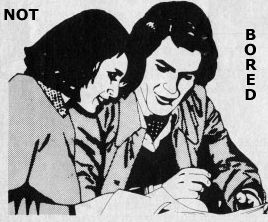
Debord and Gianfranco Sanguinetti published such classic
anti-terrorist works as
The Veritable Report on the Last Chance to Save Capitalism
in Italy (1975); Italian and French editions of
On Terrorism and the State (1978);
and the preface to the fourth Italian edition of
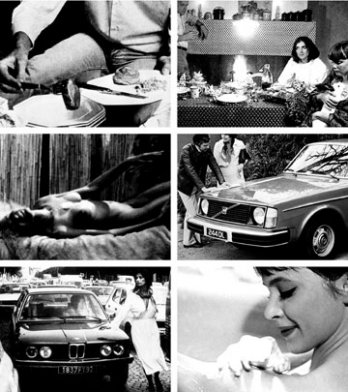
The Society of the Spectacle (1979).
In respectrospect, none of these texts can be considered "paranoid" or full of unsubstantiated "conspiracy theories": as Debord notes in Considerations, the Italian government "recently and officially confessed that its special services, with the complicity of the useful elements of the Mafia and Vatican, have been consistently present in all of the bloody operations that have been conducted since 1969, under the command of Italy's parallel government, which has managed to shelter itself under the sensitive pseudonym of P.2." But, unlike the author of Les Mots et Les Balles, Debord doesn't use the existence of this confession to highlight the corruption, cynicism and complicity of the French press, which pretended to see "terrorist or Stalinist traits in those who radically denounced terrorism teleguided by the State and Stalinism."
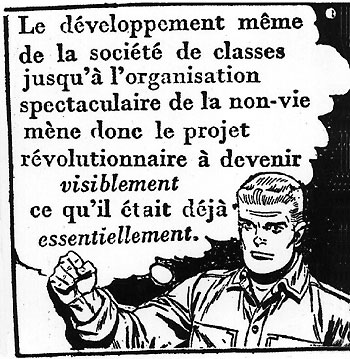
Unfortunately, Debord also fails to mention all the other Leftists who were assassinated in Paris during the 1970s and 1980s: Mahmoud Hamchari (1972), Al Kubeisi (1973), Mohammed Boudia (1973), Henri Curiel (1978), Francisco Martin Izaguirre (1979), Aurelio Fernandez Carlo (1979), Pierre Goldman (1979), Moussef Moubarak (1981), Andre Ali Mecili (1987), and Dulcie September (1988). Had he done so, Debord would have greatly strengthened his argument that Lebovici's murder wasn't an isolated event but was part of a deliberate strategy of governing. But he didn't. Maybe someone else will.
http://www.notbored.org/les-mots.html

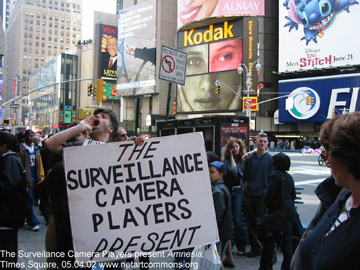
the Surveillance Camera Players (SCP)

sticker reprint this surveillance camera notice - you are being watched
http://www.notbored.org/scp-photographs.html
Labels for unmarked surveillance cameras. Suitable for framing.
Everyone knows that, on all occasions, power's representatives never say anything serious, not even about the affairs that touch them the closest; but one can ask about what these people say between themselves, far away from the public.

Veritable Report on the Last Chances to Save Capitalism in the USA
Chapter I:
Why capitalism must be democratic and the grandeur it attains in being so
What constitutes the most notable trait of our century isn't the fact that capitalism, in a reiterated and bloody fashion, has tried the workers of all industrialized countries, and also in certain countries in which the economy is predominantly agrarian; nor the fact that serious economic and monetary crises have cyclically shaken capitalism's internal stability; nor the fact that errors made in the management of power in all countries have been numerous and costly (a fact that is inseparable from all historic forms of domination).
On the contrary, what appears notable to us in our century is the fact that the capitalist system has been able to survive; that, everywhere and across different and even apparently contradictory manifestations, it is the only form of domination in the world capable of not only overcoming its crises, but also strengthening itself to the point that it can successfully extend and impose its modes of production, exchange and distribution of commodities upon the entire planet: even in the Communist countries, the economic-technological system of modern capitalism long ago won over the dominant bureaucratic class.

necessary illusions World trade centre hologramme aeroplanes
For the first time in universal history, a particular system has been imposed everywhere by annihilating the archaic forms of domination that have been opposed to it, while, at the same time, by successfully confronting the questions posed by new social forces, such as the class of industrial workers and salaried workers in general, who are necessary for the production and consumption of commodities, but have a tendentious disposition, in the name of their own "emancipation," to fight against the world in which they work and live.
It appeared necessary to us, and fitting, as well, that, at the beginning of a Report devoted to the critique of the current management of our system, to recognise that system's unquestionable historic successes and objective merits (which we see at risk of being compromised in the near future due to current errors, like the likelihood that 9/11, London, Madrid are exposed).All forms of society that have been historically dominant have been imposed upon the masses, who must be made to work, either by force or illusion. The biggest success of our modern civilisation is the fact that an incomparable power of illusion has been placed at the service of our leaders. But this is also a defect that becomes truly menacing at moments in which our power is in serious crisis; because this illusion must never be shared by the elite leadership that produces and is served by it. Cumulative and speedy economic development, despite the positive technological upheavals that have always accompanied it as its corollaries, has resulted in an extreme concentration in and a nearly absolute control over the totality of production and distribution. That this control has not possessed a strategy matching its immense means is, unfortunately, what undermines the current state of the world; and we will return to it. But, without a doubt, it is economic development itself that has demanded and brought about the separation and passivity of the agents of production to previously unimaginable degrees; this is the same phenomenon that one can read about in the chapters of social sciences, under the figures of the "consumer" and the "citizen."

There is a good chance that the operation will be uncovered.
And so was born, as a natural product of our stage of historical development, a social necessity for contemplation, of which Bergson in his time called, in Creative Evolution, "a luxury": a contemplation that a certain, privileged element of technology dedicated to the creation and diffusion of images opportunely positions as an indication of satisfaction. Reason can't abandon someone of good faith: the objective and measurable success of our society is entirely economic and technological. There isn't any more to see than what this society produces. Certain people ask us, dawdling upon a sentimentalism that is completely irrelevant to the subject: "Is it necessary that one should also love this form of production?" But the question is vain; if one admits, by virtue of posing such a question -- from no matter which transcendant point of view -- that a real society would be a complete absurdity, then the question is vain to the extent that it has already found its answer, as soon as it was posed in terms of real society, that is to say, in terms of social class. One must ask, who must also love this specific form of production? Those who appropriate surplus value necessarily love it. As for the others, why would they love it? Production in itself appears to them as a simple necessity, and what is good about it, is what is real about it. As for the debate about which particular form this necessity should assume, the capitalists have nothing on their side that is more defensible than any of the others, and so can't take for granted the advantages they have gained. One blushes to appeal to such truisms, when the excessive hypocrisy of the social thought of our era has done so much shuffling and hiding of the cards that, always on the cheat, it ends up incapable of cheating intelligently. Our workers don't in any way decide on what they produce. And, given that what they have decided to produce is what they are, is this fortunate? Undoubtedly it is and, among an infinite variety of conceivable responses, a single truth is constant: it is what the workers don't produce that suits the society we manage. And because, like us, the workers aren't dazzled by the good fortune of a multinational corporation extending its organizational chart or by the upswing in the growth of sales of war planes to countries in the Middle East, and because the workers find themselves deprived of absolutely all real compensation, it is necessary that one distributes to them some other form of compensation; and this corresponds with the massive diffusion of images for contemplation, which no longer constitues the "luxury" of which Bergson spoke, but a contemplative necessity.

a giveaway! Holographic "airplanes" Conspiracy theorists call is NOSE OUT
Can the operation of 9/11 be considered successful?
Several years now separate us from the events,
which were dangerous for all and sad for some.
the State, reduced to the role of deus ex machina, had
to stage its own terrorist negation to reaffirm its
power; because the ruse of reason that governs and
advances universal history is present in each of these
contingent and decisive episodes, as well as in the men
who don't immediately perceive it, because they are
dominated by their particular passions that serve as
the pretext for permanent conflict with each other.
Someone who has enough courage not to fear an
assessment of ingenuity will today be surprised when he
or she considers the costs of the expedient of the
bombs that produced a good effect on the masses, but
this naive hypothesis deceives itself, because, as
Machiavelli says, "Most men take what appears for what
exists: often they are animated more by things that
appear than by things that are." But -- and here
the negative limit of similar expedients is also
formulated by Machiavelli: "[...] such ways and
extraordinary recourses yield bad and unhappy results
for the Prince himself, because the more he uses
cruelty, the more his government becomes weak."

Clausewitz asks, "What is the fundamental idea of defense? Prepare for attacks. What is the characteristic of defense? Await the attack for which one has prepared [...] But an absolute defense would be in complete contradiction with the idea of war, because it would amount to supposing that only one side in the conflict fights; consequently defense cannot be relative [...] The defensive form of the conduct of war shouldn't limit itself to preparing for attacks, but should include the clever use of ripostes, as well. What is the goal of defense? To conserve." A little later, he goes on to say, "the goal of defense is negative, conservation; while that of attack, conquest, is positive; and conquest augments the means of war, conservation doesn't [...] It follows that defense shouldn't be used when one is in distress or poor, because then one will be too weak; one should abandon defense as soon as one is strong enough to propose a positive goal."
Absolute defense presupposes that only the workers can accomplish "acts of war," to remain within Clausewitz's schema; this attitude gives the workers tremendous encouragement. One waits, almost with resignation, and one makes nothing of both. Or, more precisely, one tried to justify this attitude by bringing back into play some derisive episodes of an artificial and worthless pseudo-offensive.
This is precisely why one didn't try to prevent the situation in which the operation of 911 became necessary, and why one has let Henke lead in a maladroit style that, later on and in all of Italy, imperceptibly took on the habit of confronting all the critical situations of the subsequent years by exhibiting at every turn the false card of artificial terrorism, devoid of probability but particularly useful. Since the expedient of the bombs obtained good results the first time, one has, without asking other questions, made this tactic the unique strategy, which has since become known under the names the "strategy of tension" or the "strategy of opposing extremisms." Our State, which perpetually continues to defend itself from its phantom and badly fabricated enemies (sometimes Red, sometimes Black, according to the mood of the moment), has never wanted to confront the problems posed by the real enemy of society that is founded on property and work; and wastes time by fighting the phantoms that it itself has created and by trying to create an alibi that exonerates its real desertion. And the sort of State that we have doesn't get support in its least believable struggle from the population: it has, on the contrary, harvested the results: having the para-State emergency services completely ridiculed and, as one says, "burned," and having been obliged, when the game was discovered, to put the chief of the secret services in prison.

We will say it clearly and once and for all: it is time to stop the uncontrollable use of parallel action, which is brutal, worthless, perilous to order, and, at the same time, incapable of safeguarding the most efficient procedures. And, most particularly, we would like to ask, What have been the effective fruits and the practical utility of each of the terrorist acts that have followed 9/11?
After an instance of stupidity, men ordinarily do a hundred other stupid things trying to hide the first one; and our State, always dominated by the same men, doesn't comport itself like a State, but like those men: it looks to limit the damages of an error and makes another, more serious error, and finally arrives at the point at which it isn't possible to make anything other than errors. The defense of a bad cause, one knows, is always worse than the cause itself; but the defense of a just cause -- and we have the weakness of believing that our world merits being defended -- when it is conducted maladroitly and without dignity, is in every case a crime that on all points achieves the opposite of what was desired.
On the question of the "strategy of tension" and the parallel services, it is necessary to be much more radical than the Communists, and it pleases us to resume here our thinking on the question of these phrases, which aren't ours: "[...] It seems to me that we are in extreme peril, and that there is no longer any choice between enlightening the people and preparing to fight them [...] If the plebian troubles are frightening, do not dread any less popular disgust, and we must guard against all of the steps and proceedings that excite it. Popular disgust can lead to much larger and non-exclusive troubles that are more serious and reasonable." (Thus wrote Francesco-Maria Gianni, a former State Counselor to the Grand Duke Pierre-Leopold, in a 1792 opus evocatively entitled The fears I have and the disorders I dread concerning the current circumstances of the country.)

no comment
What would a veritable elite want? Each person should interrogate himself about this, and in all sincerity. We love the company of people of taste and culture, art, the qualities of selected food and wines, the calm of our parks and the beautiful architecture of our ancient dwellings, our rich library, the handling of great human affairs or merely their contemplation from behind the wings. How could anyone believe that he could have all that, and still dump on the market (for everyone's consumption, not just for [the lower] 10 percent of our excessive population) industrially produced junk? And does one really dare to believe that such quality should be tasted and enjoyed by everyone, even the person we have made a member of the government, who still feels the sweat of his poor childhood or the fever of his studies as a young upstart?
To conclude, we will say that we are persuaded that the truth will generally be imposed.
 Stumble It!
Stumble It!


0 Comments:
Post a Comment
<< Home